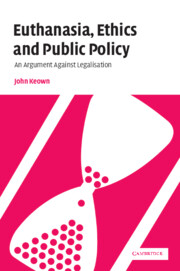Book contents
- Frontmatter
- Contents
- Preface
- Foreword
- Acknowledgments
- Table of cases
- List of abbreviations
- Introduction
- PART I Definitions
- PART II The ethical debate: human life, autonomy, legal hypocrisy, and the slippery slope
- PART III The Dutch experience: controlling VAE? condoning NVAE?
- PART IV Australia and the United States
- PART V Expert opinion
- PART VI Passive euthanasia: withholding/withdrawing treatment and tube-feeding with intent to kill
- Conclusions
- Afterword
- Bibliography
- Index
PART III - The Dutch experience: controlling VAE? condoning NVAE?
Published online by Cambridge University Press: 20 July 2009
- Frontmatter
- Contents
- Preface
- Foreword
- Acknowledgments
- Table of cases
- List of abbreviations
- Introduction
- PART I Definitions
- PART II The ethical debate: human life, autonomy, legal hypocrisy, and the slippery slope
- PART III The Dutch experience: controlling VAE? condoning NVAE?
- PART IV Australia and the United States
- PART V Expert opinion
- PART VI Passive euthanasia: withholding/withdrawing treatment and tube-feeding with intent to kill
- Conclusions
- Afterword
- Bibliography
- Index
Summary
To many, the slippery slope arguments are obviously persuasive. To others, however, they remain unconvincing, and no basis for resisting the decriminalisation of VAE in certain ‘hard cases’. Why, it is asked, should the possibility of future abuse trump the certainty of present suffering?
As VAE has historically been illegal around the world, the empirical argument has, inevitably, lacked evidential support. (The logical argument, being philosophical rather than practical, does not rely on empirical evidence, though evidence of a shift in practice from condonation of VAE to condonation of NVAE would certainly illustrate its cogency.) More recently, that situation has changed. In 1984, the Supreme Court in one jurisdiction – the Netherlands – declared that doctors could lawfully carry out VAE in certain circumstances. Since that time a substantial body of evidence has accumulated which allows the empirical version of the slippery slope argument to be tested. Given the cardinal importance of the Dutch experience to the debate, the following chapters consider whether the evidence from the Netherlands indicates that VAE is, as the Dutch claim, effectively controlled, and whether there has been a shift towards condonation of NVAE.
By way of preamble, it is worth noting that the Dutch experience is a matter of some dispute. Its defenders (who are usually but not exclusively Dutch) claim that VAE has been successfully ‘brought out into the open’ and effectively controlled. Its critics (usually but not exclusively outside the Netherlands) dispute this and maintain that VAE remains beyond effective control.
- Type
- Chapter
- Information
- Euthanasia, Ethics and Public PolicyAn Argument Against Legalisation, pp. 81 - 82Publisher: Cambridge University PressPrint publication year: 2002



